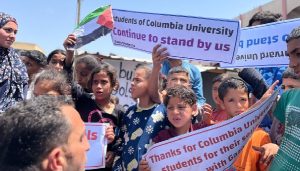06-05-2024
NEW YORK: My student journalist colleagues and I had stayed late into the night on Columbia University’s campus the previous couple of days, reporting on a story that had grabbed the world’s attention: the pro-Palestine protests and encampment that had inspired similar campaigns in schools across the United States and globally.
As I slung my camera bag on my back and began to leave campus, walking by the camp, I got a tip from a passing protester: “I would stick around till about midnight,” they said. “Maybe go home first, though.”
 Got it. I went home to charge the backup camera batteries and grab spare memory cards before leaving for campus again.
Got it. I went home to charge the backup camera batteries and grab spare memory cards before leaving for campus again.
Back at Columbia, it appeared that more than one of us had gotten the tip. Crowds of student journalists, all of us with matching paper badges and blue tape on our clothes, waited next to the encampment for whatever was to come. Our journalism faculty stood by our side, as they had been doing throughout.
Protesters grouped into “platoons”, and while we didn’t know what to expect, we kept eyes on different corners.
We split up to make sure different spots were covered; a few of us stuck by Pulitzer Hall, the home of Columbia Journalism School, where a small number of protesters had convened, while some others stood ready with cameras and recorders by the encampment.
That is when it all began. Campers began walking their tents off the lawn. One group began chanting. Another at the opposite end of the lawn sang protest hymns. I was with a small cohort of journalists who followed the tents to another small lawn, a clever decoy whether intended or not that meant many of us missed the moment, at the opposite end of campus, when protesters entered Hamilton Hall.
By the time we had run over, tens of student protesters had gathered to link arms outside the building, which their predecessors had taken over in 1968 to protest against the Vietnam War, and in 1985 to demand that Columbia divest from firms tied to apartheid South Africa.
Two of my colleagues were in the middle of the scrum, up against the doors watching two counter-protesters attempt to stop the occupation before being pushed out. Protesters rushed metal picnic tables, wooden chairs, trash cans, and planters to the doors where they were zip-tied together, effectively forming a barricade.
 Two masked individuals appeared from a second-floor balcony to cheers and applause. They unfurled a hand-painted sign, “Hind’s Hall”, a reference to the six-year-old Palestinian girl who was killed with her family in their car in January as they tried to escape Israel’s military assault in Gaza.
Two masked individuals appeared from a second-floor balcony to cheers and applause. They unfurled a hand-painted sign, “Hind’s Hall”, a reference to the six-year-old Palestinian girl who was killed with her family in their car in January as they tried to escape Israel’s military assault in Gaza.
That night, I fell asleep on the floor of a sixth-storey classroom in Pulitzer Hall to the echoes of song, one lone voice amplified through a megaphone, coming from Hamilton Hall: “This joy that I have, the world didn’t give it to me … the world can’t take it away.”
The morning before had felt very different. Columbia University’s South Lawn was packed, and the little protest village in the heart of the campus dozens of tents and tarps comprising the “Gaza solidarity encampment” was bustling with life, two weeks since its erection.
The protest is rooted in a decades-long movement for Palestinian rights in their homeland, and to hold Israel accountable for its illegal occupation of Palestinian territories. The current campaign against Israel’s war on Gaza in which more than 34,000 people have been killed also aims to pressure Columbia to divest from Israel-linked companies, just as the university did in the case of apartheid South Africa after similar protests four decades ago.
 Pressmediaofindia
Pressmediaofindia




